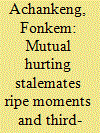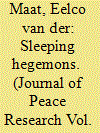|
|
|
Sort Order |
|
|
|
Items / Page
|
|
|
|
|
|
|
| Srl | Item |
| 1 |
ID:
124109


|
|
|
|
|
| Publication |
2013.
|
| Summary/Abstract |
A rich literature addresses how a state's capabilities, its desire to aid or exploit a warring neighbor, and its alliance commitments determine whether or not the state joins an ongoing conflict. However, an important geopolitical consideration - proximity to the location of the ongoing conflict - has yet to be examined. The authors argue that states are more likely to join conflicts that occur close to their territories than conflicts that are located at a greater distance, and that accounts that do not pay attention to this distance are incomplete. Proximity to the location of an ongoing conflict affects the opportunity for a state to join (by decreasing costs), while also affecting the state's willingness to join (by increasing the potential threat to the state's security). A series of statistical models provide evidence for the authors' claims: a state's opportunity to join and its willingness to aid or exploit a neighbor in conflict, or to fulfill its alliance commitments, are each conditioned by its proximity to the location of the conflict. This conditioning effect of dispute location is important because it helps account for cases that appear to contradict the expectations of existing arguments regarding capabilities, contiguity, and alliances - such as when weak, non-contiguous, and non-allied states join ongoing conflicts and strong, contiguous, and allied states do not join.
|
|
|
|
|
|
|
|
|
|
|
|
|
|
|
|
| 2 |
ID:
111177


|
|
|
|
|
| Publication |
2012.
|
| Summary/Abstract |
This paper explores ex-British Southern Cameroons' restoration of independence and statehood conflict with the Republic of Cameroon from the perspective of Zartman's 'mutual hurting stalemates' and 'ripe moments' framework in the timing of peace initiatives by third-party interveners. In analysing the conflict, the argument in the article is that powerful third parties need to use their power to intervene in deep-rooted conflicts whether or not they are violent, because violent or not, such conflicts remain destructive. The article traces the conflict from the independence-by-joining concept of the United Nations against the background of the incompatibility theory of plural societies. It provides an exploration of the dynamics involved in Zartman's framework, including its criticisms. The discussion of the implications of the concept highlights the vested interests of international mediating powers in play in international mediations, especially in post-colonial settings involving power imbalance between the conflict parties. In situations such as the Southern Cameroons' restoration of independence and statehood conflict with no open war and thousands of casualties, refugee flows and visible material destruction, the article questions whether the 'mutual hurting stalemates' and 'ripe moment' concept may not be a rationalisation for inaction.
|
|
|
|
|
|
|
|
|
|
|
|
|
|
|
|
| 3 |
ID:
103718


|
|
|
|
|
| Publication |
2011.
|
| Summary/Abstract |
It is not clear why some territorial transgressions lead to intervention by the international community and others do not. As most territorial transgressions lead to a reaction from the international community but a few, however, do not, this study examines the main determinants for non-intervention by capable members of the international community, following violation of the territorial integrity norm by a deviant state. This article focuses on which characteristics of the norm-transgressing state, the conflict, and the state capable of enforcing the norm affect the occurrence of non-intervention. This comparative study examines six major alleged transgressions of the territorial integrity norm - the occupation of Tibet, the Suez crisis, the 1967 six-day war, the Indonesian occupation of East Timor, the Moroccan occupation of the Western Sahara, and the 1989 Gulf crisis - using a multi-methodological approach based on qualitative methods, most notably fuzzy-set Qualitative Comparative Analysis. Analysis reveals that the absence of high security costs to the hegemon in combination with (a) strategically important security relations between the transgressor and the hegemon or (b) absence of military and economic vulnerability are generally necessary and sufficient for non-intervention.
|
|
|
|
|
|
|
|
|
|
|
|
|
|
|
|
|
|
|
|
|